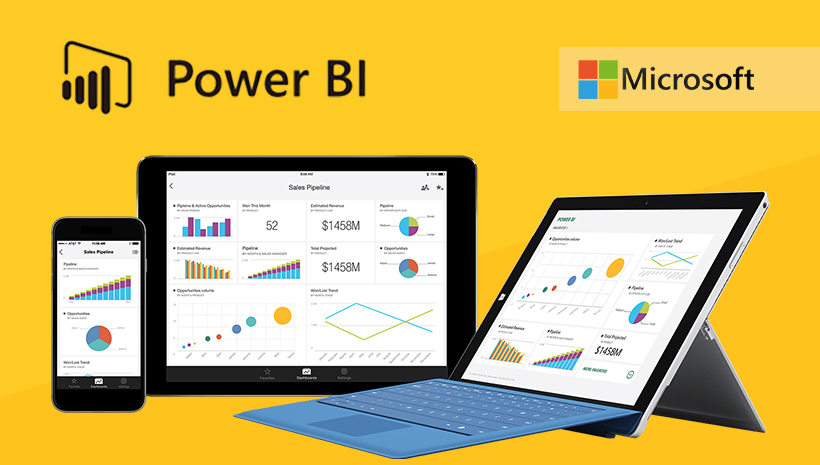In today’s data-driven world, small businesses face increasing pressure to make informed decisions quickly and accurately. Business intelligence (BI) solutions, once reserved for large corporations with dedicated IT teams and hefty budgets, have become essential for businesses of all sizes. Microsoft Power BI is one of the most affordable and accessible tools that empower small businesses to harness the power of data without breaking the bank. This article explores how Power BI business intelligence can be a game-changer for small businesses looking for cost-effective BI solutions.
1. What is Power BI?
Power BI is a cloud-based business analytics service by Microsoft that allows businesses to visualize data and share insights across their organization. It combines various data sources, processes the data into actionable insights, and presents it through interactive dashboards and reports. Power BI is known for its user-friendly interface, robust features, and ability to integrate seamlessly with other Microsoft services, making it a go-to solution for small businesses.
2. Affordable Pricing Plans for Small Businesses
One of the biggest advantages of Power BI is its affordability. Power BI offers a free version, Power BI Desktop, which is ideal for small businesses with basic BI needs. This version allows businesses to create and share data visualizations, offering essential features like data transformation and interactive reporting.
For businesses that require more advanced features, Power BI Pro is available at a low monthly subscription fee. With Power BI Pro, users can collaborate and share reports across the organization, access real-time data, and utilize other powerful tools like natural language query processing.
3. Key Benefits of Power BI for Small Businesses
a. Ease of Use
Small businesses often don’t have dedicated IT teams to manage complex software. Power BI is designed with non-technical users in mind. Its drag-and-drop interface, pre-built templates, and intuitive design make it easy for anyone to create reports and dashboards. This user-friendly experience allows small businesses to quickly adopt the platform and get up to speed.
b. Integration with Existing Tools
Many small businesses already use Microsoft products like Excel, Office 365, and Teams. Power BI integrates seamlessly with these tools, allowing users to import data directly from Excel spreadsheets or work within familiar environments. This integration reduces the learning curve and helps businesses maximize the value of their existing tools.
c. Data Consolidation from Multiple Sources
Power BI allows small businesses to consolidate data from various sources such as spreadsheets, cloud services, and on-premises databases. This feature is essential for businesses with multiple data streams, enabling them to have a comprehensive view of their operations, sales, and customer behavior in one place.
d. Scalability
As a cloud-based platform, Power BI offers scalability that small businesses need. Businesses can start with the free version and upgrade to paid plans as their BI needs grow. This flexibility ensures that businesses only pay for what they need and can expand their usage as their operations grow.
4. Real-Time Data Insights
Power BI offers real-time data analysis, which is crucial for small businesses that need to make fast, data-driven decisions. With live dashboards, business owners can monitor key performance indicators (KPIs) and metrics as they happen. This capability is particularly useful for retail, hospitality, and service industries, where being responsive to changes in customer behavior can be a competitive advantage.
5. Data Visualization and Storytelling
One of the standout features of Power BI is its ability to turn raw data into visually appealing reports and dashboards. Data visualization helps small businesses present their data in a way that is easy to understand and interpret. With interactive charts, graphs, and heat maps, Power BI allows small business owners and employees to spot trends, uncover insights, and make decisions based on a clear understanding of their data.
6. Collaboration and Sharing
Power BI makes it easy for small businesses to collaborate on reports and share insights across teams. With Power BI Pro, users can publish reports to the cloud, making them accessible to employees anywhere, on any device. This collaborative capability is essential for businesses with remote or distributed teams, as it ensures that everyone is working with the same up-to-date information.
7. Security and Compliance
Data security is a top priority for small businesses, and Power BI offers enterprise-grade security features. It complies with industry standards like ISO 27001 and GDPR, ensuring that sensitive business data is protected. Power BI also allows businesses to control access to reports and dashboards, ensuring that only authorized users can view or edit sensitive information.
8. Customizable Reports and Dashboards
Power BI gives small businesses the ability to create fully customizable reports and dashboards tailored to their specific needs. Whether it’s tracking sales performance, monitoring cash flow, or analyzing customer behavior, Power BI allows businesses to visualize the data that matters most to them. Customizable features like data filters, drill-downs, and real-time updates make it easy to explore data in depth and gain meaningful insights.
Conclusion
For small businesses, the need for data-driven decision-making has never been greater. Power BI offers an affordable, scalable, and user-friendly solution that brings the benefits of business intelligence to businesses of all sizes. By integrating data from multiple sources, providing real-time insights, and offering powerful visualization tools, Power BI helps small businesses stay competitive in today’s fast-paced market. Whether you’re looking to streamline operations, improve customer service, or grow your business, Power BI can be the key to unlocking your data’s full potential.


